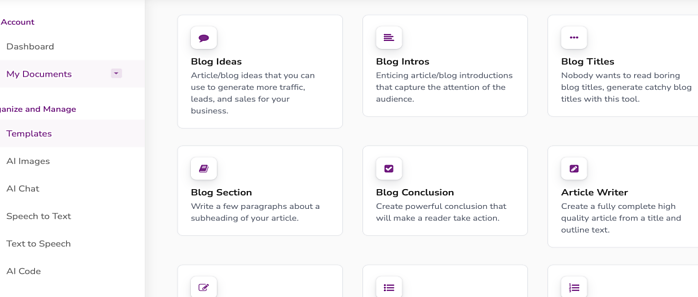In the ever-evolving landscape of search engine optimization, writing articles online using AI that both engages your audience and ranks high in search engine results has become crucial.
With the rising prominence of Artificial Intelligence (AI) in shaping search algorithms, crafting an AI article has become a top priority for content creators.
This article aims to guide you through the process of creating an AI article that not only captivates your audience but also boosts your search engine rankings.
Let’s dive in and uncover the secrets of writing articles online using AI that actually rank.
Writing Articles Online Using AI
Ok, I have been using Content Verse for a while now to help me write my articles for my blogs and it has been a game changer.
At first, I thought that it would affect my rankings, but I have seen an increase in traffic since using this platform.
Although it is tempting to let A.I. simply write the whole article for you, it is unwise as it is too robotic. Remember that you are writing for humans and not robots, so if you find it boring to read, so will your visitors.
I generally use the A.I. platform to generate ideas for me, including subheadings, intros, and conclusions and then I simply fill in the blanks with my own words.
Sometimes I take an individual heading and ask Content Verse to elaborate further and it does a wonderful job.
If you want to read my review on Content Verse, simply click here.
Let’s show you how I do it.
I went into Content Verse and asked for an article on how to write an article using A.I. and it generated an intro, some topics to discuss, and a conclusion.
I have decided to use some of them in this article and I deleted others as I thought they would make the article too long-winded.
The image below shows some of the templates that they offer.

Understanding AI’s Impact on Search Rankings:
The Rise of AI Algorithms:
In the ever-evolving digital landscape, search engine optimization (SEO) continues to play a crucial role in driving online visibility and traffic.
Over recent years, Artificial Intelligence (AI) algorithms have ascended to the forefront of determining search rankings.
By understanding how to craft AI-centric content, businesses, and individuals can effectively optimize their online presence and achieve higher visibility.
AI Content Generation: The Game-Changer
Gone are the days when writers had to spend hours brainstorming ideas, conducting research, and drafting content.
With AI-powered content generation tools, the process has become faster and more efficient. These tools use Natural Language Processing (NLP) algorithms to generate human-like content, enabling writers to save time and focus on more strategic aspects of their work.
One of the key benefits of AI content generation is its ability to produce diverse and comprehensive articles.
By analyzing vast amounts of data, AI algorithms can generate content on a wide range of topics, ensuring that businesses can cater to their target audience’s needs effectively.
This versatility not only saves time for writers but also improves the overall quality of content by offering unique perspectives and fresh insights.
Impact on Ranking Factors
The impact of AI on ranking factors cannot be overlooked.
Search engine algorithms, such as Google’s, continuously strive to provide the most relevant and valuable content to users. AI-powered content generation plays a significant role in meeting this demand.
AI-generated articles are designed to meet the criteria that search engines look for when ranking pages. These articles are tailored to incorporate target keywords organically, ensuring optimal visibility in search engine results pages (SERPs).
Additionally, AI algorithms can analyze user behavior data to create content that resonates with the audience, leading to increased engagement and better-ranking prospects.
Identifying Relevant Keywords:
To identify relevant keywords to use in my AI-generated article, I use my Jaaxy Keyword Tool to do some market research into what people are looking for.
Jaaxy tells me how many people are searching for specific keywords every month and it also tells me what the competition is like for that specific keyword.
I usually go for long tail keywords as they are far easier to rank for as there are not as many competing sites to contend with.
Understanding the Audience and Purpose:
Identifying the Target Audience:
Before diving into writing an AI article, it is crucial to understand the audience you are addressing.
Identifying whether the article is intended for industry experts, students, or general readers will help you tailor the content accordingly, striking the perfect balance between technicality and accessibility.
Clarifying the Purpose:
Clearly defining the purpose of the article lays the foundation for its structure and direction. Determine whether the article aims to educate, inform, or provoke discussions to ensure a focused and impactful narrative.
Researching and Gathering Information:
Extensive Research:
To write an authoritative AI article, thorough research is indispensable.
Dive into reputable sources such as academic journals, white papers, and reliable online platforms for the latest insights and advancements in AI technologies. Analyze case studies and research papers to support your claims and provide evidence-based arguments.
Structuring the Information:
Organize the gathered information into a coherent structure, allowing readers to navigate through the article seamlessly. Use clear headings and subheadings to compartmentalize different aspects of AI effectively.
Creating Engaging Content:
Captivating Introduction:
Begin the article with a compelling introduction that grabs the reader’s attention. Use a distinct hook or present an intriguing fact related to AI to pique their curiosity and entice them to read further.
Clarity and Simplicity:
While delving into AI topics, simplify complex concepts without compromising accuracy.
Aim to strike a balance between accuracy and accessibility. Use appropriate analogies and examples to make the content relatable to readers with varying levels of expertise.
Engagement through Storytelling:
Incorporate storytelling techniques to engage readers emotionally.
Sharing real-world AI applications and success stories can captivate readers’ attention, making the article more relatable and persuasive.
Structure and Formatting:

Logical Flow:
Ensure a logical flow throughout the article by structuring the content in a clear and organized manner. Each paragraph should connect seamlessly, leading the reader from one idea to the next.
Utilize Headings and Subheadings:
Integrate headings and subheadings to break down the article into sections.
These help readers quickly skim through the content and locate relevant information. Make use of descriptive subheadings to provide a clear overview of the subsequent paragraph.
Lists and Bulleted Points:
Incorporate lists and bulleted points to create visually appealing content and enhance readability.
Bullet points allow for a concise presentation of key information, making it easier for readers to grasp essential details.
Conclusion:
Conclude the AI article by summarizing the main points discussed throughout the content. Offer closing thoughts or insights that prompt further reflection on the topic.
You can ask A.I. to generate a conclusion for you and add your ideas into the mix.
Avoid introducing any new information in this section, as it is meant to provide a concise overview of the article’s key takeaways.
In conclusion, writing an effective AI article requires a tailored approach, honed research skills, engaging content creation, and a visually pleasing structure.
By understanding the target audience, conducting thorough research, and implementing storytelling techniques, you can craft compelling AI articles that educate, inform, and professionally inspire readers.
With these effective strategies and attention to detail, you have the power to unlock the potential of words and make a significant impact in the realm of AI discourse.
Keep evolving your strategies when writing articles online using AI as AI continues to shape the digital landscape, and you’ll be on your way to reaching a wider audience and maximizing your online presence.
![]()


Hey thank you for this post!
It was certainly interesting to read and learn about writing articles using ai! It is true when you say not to use ai entirely since it for sure can seem robotic which will lead google to not rank the posts high. Ai is a big help however like you have stated it can be bad for the business if used too much.
Thanks again for this post! Have a great day!
Thanks, Sariya. Yes it is a huge help, but we should not treat it as the end product, because real human interaction is essential when engaging with your visitors.
I enjoyed reading your article, and I agree with you about tweaking the AI content to make it appear far more “human”. With the release today of AI Author within Wealthy Affiliate, the same advice is given by Kyle. I was just wondering how long it takes you to edit your content once it has been prepared by Content Verse. The art certainly seems to be mixing AI technology with human input.
Hi Pickwick,
When I use Content Verse, I normally do my articles in a quarter of the time than I used to. I see Wealthy Affiliate has also released an AI platform which is awesome, so I will definitely be trying out that one too. But I see you need to purchase credits once you run out, so I am glad that I have Content Verse as a backup.
I have used AI to gather ideas about articles I write but not to write the article itself. I was unfamiliar with Content Verse and appreciate learning that it increases Search Rankings. I agree it is important to write keeping your specific audience in mind and keeping the content authentic. This leads to identifying the best keywords.
Jaaxy is an excellent tool for that. With the appropriate research, it enables us to create compelling content. AI is an excellent tool in the creation of content.
Thanks for stopping by Joseph. I agree that Jaaxy is also an excellent tool to help with the research process, and I use this platform before I start to do any new articles.